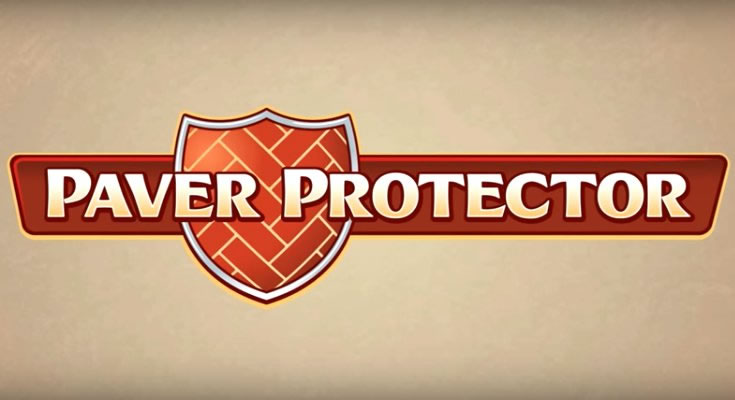Why should I seal my pavers?
There are many reasons to seal brick pavers. Sealer will protect pavers from the suns harsh UV rays which over time fades the color of your pavers and leaves the grey and white small stones more visible than the color. Sealer will also make the surface of your pavers less absorbent. This means muddy shoes, bird droppings, oil spills, etc… are easier to clean with a hose. Most people say they like the way their pavers look when it rains. Our wet look sealer captures that effect which restore and enhances colors.
How long does the sealer last?
We normally use a solvent based acrylic sealer as our wet look sealer. The manufacturer says you can get up to 4-5 years out of it depending on conditions. We don’t recommend sealing your pavers any more often than once every 2 years to avoid an acrylic buildup. Depending on what type of exposure your pavers have to sun, traffic, and other elements is a determining factor of how long it will last. Typically 3 years is a good maintenance interval.
How much does it cost?
There are too many variables to put a square foot price on our services. Current condition, size, paver type, surroundings all play into pricing. We provide free, no obligation quotes so give us a call or click the free estimate tab to obtain your pricing.
Why should we use Paver Protector?
Paver Protector uses state of the art equipment to complete your project. We have tested many types of sealers and have found the longest lasting, best looking sealers and work closely with the manufacturer in product selection. We have gone through training specific to cleaning and sealing concrete pavers and have been tested and presented with certified applicator certificates. We know that every customer deserves the best service no matter how big or small their project. We put our customers first from the initial quote to completion and beyond.
What will it look like?
The sealer we use gives your pavers a deep wet look. If you were to look at your pavers during the rain, that is how they will look once sealed. This brings color back from faded pavers and enhances colors on new pavers. Our sealer in a penetrating sealer that the pavers absorb into the surface, this allows the pavers to look wet without having a very shiny, glossy finish. We have pavers half sealed and half not sealed in many colors as samples. Ask to see a color close to yours on your free estimate. We also have a natural look sealer that will protect your pavers without changing their appearance.
Can you clean stains?
Our initial cleaning process uses hot, 200 degree, pressurized water that does clean most stains. For tough stains such as grease, oil, rust etc… we have chemical cleaners made specifically for concrete pavers designed to lift stains without ruining the color pigments.
Is the sealer slippery?
Since we use a penetrating sealer it does not leave a very slippery surface. We have samples that you can feel to see the difference between sealed and not. There are a lot of sealers on the market that do remain on the surface of pavers and leave a very slippery surface. Most inexperienced contractors and home improvement stores use these types of sealers. We also have traction additives for high slip areas like pool decks that will give brick pavers more grit then when unsealed.
Can I seal it myself?
If someone tells you that you cannot seal your pavers yourself they are lying. It is very involved and easy to screw up if not properly done. By the time you rent the proper washing equipment, install polymeric sand, which is also easy to screw up, and spend the time to seal, it is usually cheaper to have it professionally done. Be aware of the products you can buy at hardware stores. It is very costly to fix an improperly sealed job. If you do decide to seal your pavers yourself we can sell the proper materials needed.
Why would I use polymeric sand?
Polymeric sand hardens when wetted for the first time. Unlike regular joint sand it is resistant to washing out of the joints with heavy rain or rinsing. It also is very hard for weeds to grow through and insects to travel through. This is a much longer lasting solution than sweeping regular sand every year. As sand washes out of joints you loose structural integrity because the sand is what interlocks the pavers. You will start to see settling, rotation and separating of your pavers. Polymeric sand prevents this
Can you fix my sunken pavers?
We do repairs of all types. Whether the pavers are sinking from insects removing and tunneling through bedding sand or from improper initial installation. We have several methods to fix and prevent future problems.
Why are my pavers sinking around concrete?
When concrete is installed a different base material is installed and usually not fully compacted. If you have a paver system that is up against it you will usually have excessive settling there. The sand from the paver base washes out into the voids under the concrete base. We can fix this by installing a barrier when possible and adding sand. When the pavers are sealed and have polymeric sand installed not as much water will pass through the sand, avoiding this problem in the future.
The plastic edging around my pavers is coming up.
We can fix this with minimal damage to the surrounding grass. We pull up the edging, excavate to the proper height and reinstall edging, usually with more spikes to ensure a longer lasting result.

